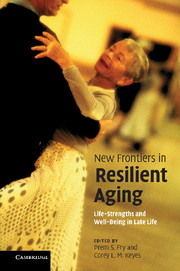Book contents
- Frontmatter
- Contents
- Figures
- Notes on contributors
- Foreword
- Acknowledgments
- Introduction
- 1 Sources of human life-strengths, resilience, and health
- 2 Growth is not just for the young: growth narratives, eudaimonic resilience, and the aging self
- 3 Physical resilience and aging:
- 4 You can teach an old dog new tricks:
- 5 Resilience in the face of cognitive aging:
- 6 Why do some people thrive while others succumb to disease and stagnation?
- 7 Psychosocial resources as predictors of resilience and healthy longevity of older widows
- 8 Resilience and longevity:
- 9 The socioemotional basis of resilience in later life
- 10 Emotional resilience and beyond:
- 11 Risk, resilience, and life-course fit:
- 12 Resilience in mobility in the context of chronic disease and aging:
- 13 Positive aging:
- Index
- References
3 - Physical resilience and aging:
correcting the Tithonus error and the crème brûlée error
Published online by Cambridge University Press: 06 December 2010
- Frontmatter
- Contents
- Figures
- Notes on contributors
- Foreword
- Acknowledgments
- Introduction
- 1 Sources of human life-strengths, resilience, and health
- 2 Growth is not just for the young: growth narratives, eudaimonic resilience, and the aging self
- 3 Physical resilience and aging:
- 4 You can teach an old dog new tricks:
- 5 Resilience in the face of cognitive aging:
- 6 Why do some people thrive while others succumb to disease and stagnation?
- 7 Psychosocial resources as predictors of resilience and healthy longevity of older widows
- 8 Resilience and longevity:
- 9 The socioemotional basis of resilience in later life
- 10 Emotional resilience and beyond:
- 11 Risk, resilience, and life-course fit:
- 12 Resilience in mobility in the context of chronic disease and aging:
- 13 Positive aging:
- Index
- References
Summary
Abstract
One of the most persistent misconceptions surrounding the prospect of combating aging – so persistent, in fact, that it has acquired a name, “the Tithonus error” – is that successful anti-aging interventions would postpone death but would not postpone the decline in health and vigor that characterizes later life. The psychological reasons for why so many people have for so long remained deaf to gerontologists' incessant and vocal correction of this error are complex and have been addressed in my previous work. Here I discuss the physiological basis for the confidence, shared by all biologists of aging, that the only way we will ever substantially extend the human lifespan is by extending people's healthy lifespan, rather than by keeping people alive in a frail state. I then discuss what these physiological realities tell us about which approaches to combating aging are the most promising, and why they are likely to lead to the substantial (and, eventually, dramatic) postponement of what is now humanity's number one killer.
Introduction: the Tithonus error and the pro-aging trance
Ill health is risky
That is really the beginning and end of what I need to communicate in this section. It certainly does not seem particularly controversial. But, in practice, a phenomenal amount of effort has been expended in both asserting and resisting this simple truth.
- Type
- Chapter
- Information
- New Frontiers in Resilient AgingLife-Strengths and Well-Being in Late Life, pp. 90 - 103Publisher: Cambridge University PressPrint publication year: 2010



